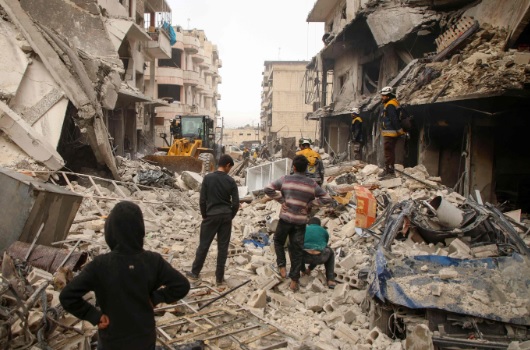Special to WorldTribune.com
A decade ago, winds of change and calamity blew across the Middle East. From Tunisia to Egypt, Syria, and later Libya, entrenched autocracies were challenged politically by what became known as the Arab Spring, a series of popular and quasi-democratic uprisings which shook the status quo and smashed the old order.
Sadly, the Arab Spring soon evolved into the Arab Winter as most of the countries with the exception of Tunisia, saw these popular uprisings hijacked by hardline Islamic fundamentalists and a motley gaggle of militant terrorist groups.
Syria’s turn came in March 2011 when demonstrations in provincial towns dared challenge the entrenched Assad Family regime whose power dates back to the late 1960’s. Syria was a classic Arab autocracy blending nationalism, socialism and family power; it was however a secular state given the rich and competing religious currents which ran through this land since ancient times.

Bashar al-Assad, cracked down on demonstrators the old fashioned way, but was unable to stop the spreading political discontent and pent up social frustrations which confronted his rule. Despite heavy fighting and losses Assad’s army held, and surprisingly he remains in power, propped up by a Russian military intervention in 2015 as much as by a divided opposition.
Now a decade has passed with more than 500,000 people killed and millions displaced.
In a special General Assembly session on Syria, President Volkan Bozkir stated, “Syria, marks a dark milestone for humankind. A decade of death, displacement and destruction, has left the Syrian people with little hope.”
In one of his periodic and plaintive briefings, UN Humanitarian Coordinator Mark Lowcock, told the Security Council, “Around 60 per cent of the Syrian population, that’s 12.4 million people, do not have regular access to enough safe and nutritious food.” He added, “An additional 4.5 million people have fallen into this category over the last year.”
Humanitarian aid access remains a serious stumbling point; the Damascus government has allowed few border crossing points thus creating intentional humanitarian bottlenecks. UN Secretary General Antonio Guterres stresses that when it comes to delivering lifesaving aid to people, “all channels should be made, and should be kept available.”
But as Undersecretary General Lowcock conceded, “Conditions in the north-west are now worse than they were when the Security Council decided to extend its authorization for cross-border-assistance last July.” These border bottlenecks are along the Turkish frontier.
Countless detailed UN humanitarian briefings and a drumbeat of Security Council deliberations over the past decade have yet to change Syria’s political calculus.
The UN Security Council has locked into an East/West confrontation regarding the Syrian conflict with Russia and China on one side facing the U.S., Britain and France on the other. Both Moscow and Beijing have used their veto to protect their client state in Damascus.
Ireland’s UN Ambassador Byrne Nason stated “Over the past ten years, this Council has heard many harrowing reports. Each time, we imagine things could hardly get worse.”
The Secretary General’s report to the Security Council paints a bleak picture; “The civilian population in the Syria Arab Republic has entered 2021 amid some of the most challenging humanitarian conditions experienced in the past 10 years of conflict. Millions inside the country and millions of refugees outside are grappling with deep trauma, personal insecurity, grinding poverty and a lack of hope for the future.”
According to the UN High Commission for Refugees (UNHCR) since the start of the conflict 5.6 million Syrians have become refugees; 3.6 reside in Turkey and almost a million in Lebanon.
A once thriving Christian community inside the country has been decimated and persecuted by anti-government Islamic militants.
Modern Syria remains a geopolitical witches brew where Russian forces, Iranian militias, and Assad’s beleaguered but now gaining military, battles with ISIL terrorists and remnants of armed groups such as Al Nusra jihadis. During the height of the Syrian war a few years ago, the country became the rallying point for International jihadi foreign fighters much as the Spanish Civil War in the late 1930s emerged as an epicenter of competing big power play interests.
Just recently Russian warplanes carried out attacks on ISIL terrorists. Equally a U.S. airstrike on pro-Iranian militias inside sovereign Syrian territory signaled the Biden Administration’s first but hopefully limited foray into the bewildering conflict. This is not America’s war.
Avoidable humanitarian disasters, millions of refugees fleeing the country, and a steady blood drip of causalities from a decade long conflict, define this sorry land exhausted from fighting itself.
John J. Metzler is a United Nations correspondent covering diplomatic and defense issues. He is the author of Divided Dynamism the Diplomacy of Separated Nations: Germany, Korea, China (2014). [See pre-2011 Archives]

 By
By